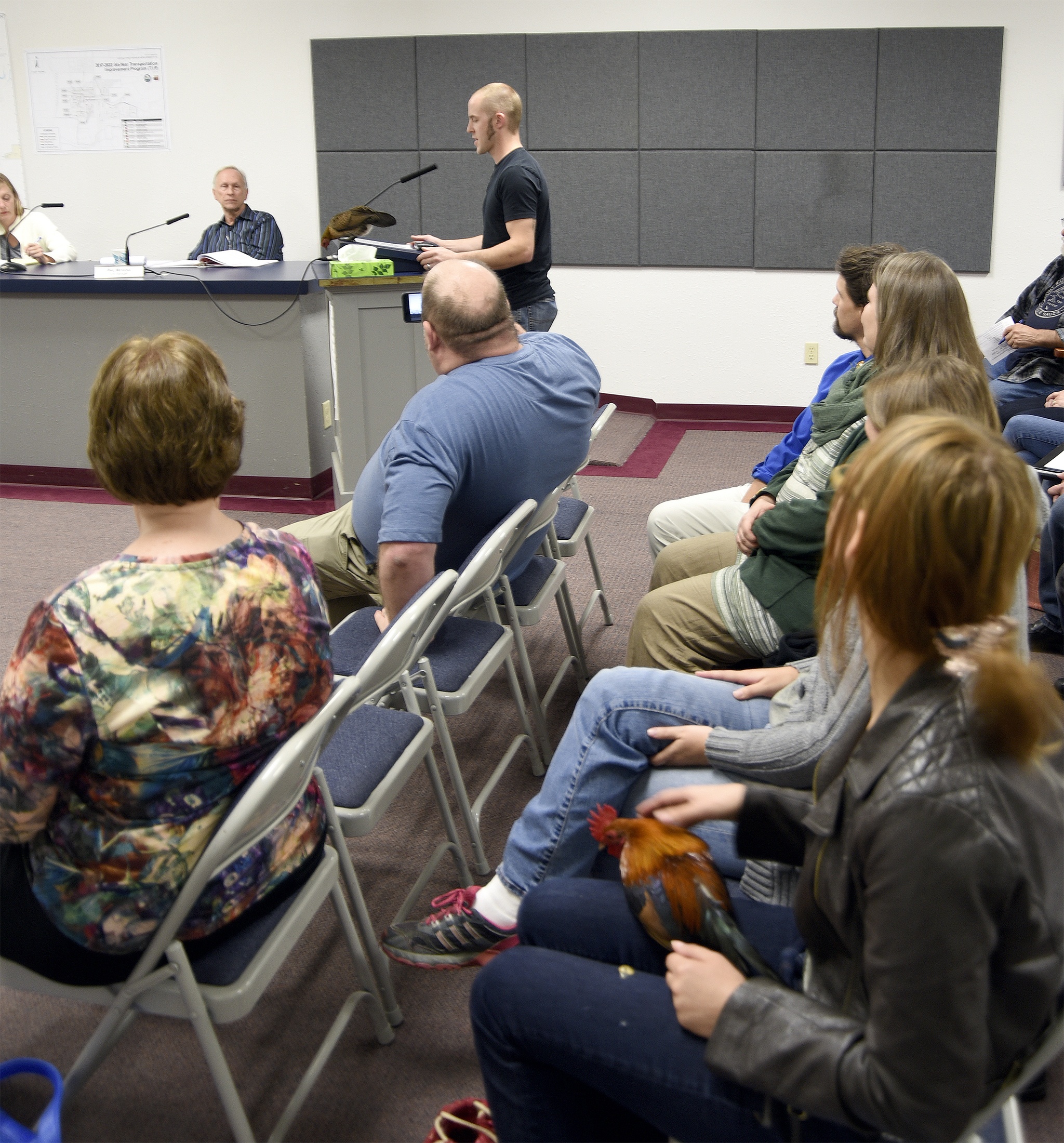Carnation is not a sleepy little town any more. The city of about 1,800 people is starting to grow, with 65 homes permitted, or almost through the permitting process, for construction in four subdivisions, plus infill development. That growth, while welcome for its potential revenue to the city, may be a threat to Carnation’s “country cool” culture, according to about a dozen people — and two chickens — who spoke at last Tuesday’s Carnation City Council meeting.
“It doesn’t seem like a Carnation kind of thing to do,” resident Sarah Clark told the council as it began a discussion on two code changes that would prohibit residents from keeping roosters in residential zones, limit the number of chickens to four and prohibit other livestock, including ducks and goats, on lots less than half an acre in size.
The code changes were presented as a preliminary suggestion, City Manager Phil Messina said.
“This is what we’re presenting for discussion, it is not set in stone,” he said. “We’re not telling people they can’t have chickens, we’re just trying to limit the impact on their neighbors.”
What triggered the proposed change, Messina told the council, was a problem between two neighbors. One of them worked nights and had complained to the city that she was unable to sleep during the day because of her neighbor’s rooster, which crowed around the clock.
Messina said he talked to the other neighbor, who agreed to get rid of the rooster. However, the dispute highlighted a couple of issues with the city’s existing code.
“We didn’t have anything in our code that said ‘No, you can’t have roosters,'” Messina said, and the two sections of code dealing with animals in the city were both more than 20 years old. One section referred to zoning that no longer existed in the city, too.
“We may be in a rural area, but we are a city,” he added.
Messina said he and other city staff members researched other cities’ animal codes before making the recommendations. He also noted that most of the lots in Carnation are small.
“We really only have a couple of large parcels in town where people could have a horse,” he said.
Many of the speakers compared Carnation’s proposed code changes with area cities. Duvall, Bellevue and Seattle each allowed more animals than the proposed four-hen limit being considered in Carnation, but all of them prohibit residents from keeping roosters on residential properties.
North Bend and Snoqualmie have adopted King County’s code regarding animals, which is not specific about numbers of animals allowed, apart from a restriction that they must be permitted and have enclosed living quarters, with limitations based on space.
“We are ‘country cool,'” said business owner Kathleen Allen. “Please don’t make us look like the most restrictive place on the map in terms of growing your own food.”
A medical professional, Allen cited many of the benefits of growing your own food. So did Juliane Luna, who said “Chickens are really a cheap and effective way for people to have access to local, organic food and I think taking that away from people is going to be taking away something that’s first of all part of our culture and second something that’s accessible to anyone, no matter their class.”
Luna sat through most of the meeting with her two chickens on her lap, although she loaned one to Dan Hearing when he spoke to the council. The birds clucked occasionally, adding some inadvertent comedy to the meeting.
“Why limit this little guy from being in my back yard?” Hearing asked the council.
During the council discussion on the proposed change, Councilman Fred Bereswill said of the animal limitation, “We’re not trying to make it smaller, we’re trying to make it current.”
Council members then discussed the issues related to keeping chickens, including noise, odor and the potential to attract rats and other vermin. They agreed that those issues would need to be addressed, too.
Regarding the city’s noise ordinance, which several residents said should be the deciding code on animal complaints, rather than the proposed changes, Messina said it does work, but “It’s difficult. We need at least two complaints from neighbors before we can use the ordinance.”
Councilman Dustin Green also questioned the prohibition on ducks in the proposed code change.
Councilwoman Lee Grumman echoed some of the citizens’ comments, saying “I like the idea of not restricting our residents’ ability to grow their own food… maybe it will contribute to our culture.”
No formal vote was taken on the issue, and the council agreed to send the issue to the council’s economic development committee for review and recommendation in the next few months.
The council will meet next at 7 p.m., Tuesday, Oct. 4, at Carnation City Hall. For more information, visit www.carnationwa.gov.



